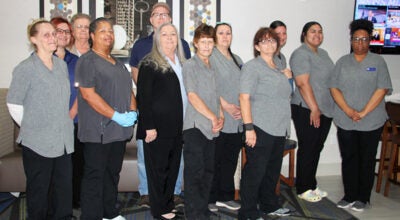ADPH: Illness isn’t avian flu
Published 11:57 pm Thursday, May 23, 2013
Similar cases seen locally
Many people are breathing more easily after the Alabama Department of Public Health announced Thursday it has determined that the cause of a respiratory illness cluster in southeast Alabama was a combination of influenza A, rhinovirus, the virus associated with the common cold, and bacterial pneumonia.
At least seven people had been hospitalized and two, including a Luverne native, had died from the illness many feared was a form of bird flu.
At Andalusia Regional Hospital, officials said Thursday they have had a few cases with patients presenting the same symptoms.
“We have seen a few cases present to our emergency room with all three symptoms – fever greater than 100.4, coughing and shortness of breath,” said Bobby Meyer, ARH infection control director. “We are actively screening those patients based on the guidelines received from the Alabama Department of Public Health and the CDC. The specimens that we collect are being sent directly to the (ADPH) clinical laboratory.”
Public health officials began an epidemiological investigation to interview the families of the patients about travel and exposure.
Specimens were requested and submitted to ADPH’s clinical laboratory.
Of the seven patients whose specimens were submitted, six were found to be positive for either influenza A, rhinovirus or a combination of the two and three patients were found to have bacterial pneumonia.
“This is good news,” State Health Officer Dr. Don Williamson said. “Testing has ruled out avian flu and novel coronavirus.”
Meyer encouraged anyone with symptoms to seek medical attention.
“If you or your family members have respiratory symptoms of fever, cough and shortness of breath, please contact your health care provider to be evaluated,” she said.
State health officials said Thursday “while enhanced surveillance associated with this cluster is no longer necessary, health care providers are encouraged to continue routine year-round influenza surveillance activities and submit specimens to the state laboratory for testing.”
It is also recommended that if you or your family members have respiratory systems you should take the following steps to prevent transmission of disease:
• Cover your cough or sneeze with a sleeve or tissue;
• Wash your hands often with soap and water; especially after you cough or sneeze. Alcohol-based hand sanitizers are also effective;
• Avoid touching your mouth, eyes and nose with your hands. Try to avoid close contact with sick people;
• If you get sick, stay home and limit contact with others to avoid infecting them.




